Trending
Opinion: How will Project 2025 impact game developers?
The Heritage Foundation's manifesto for the possible next administration could do great harm to many, including large portions of the game development community.
Have you ever wondered which game engines are most popular on the world's biggest game platform? Lars Doucet got his hands on data to find out how the game engine race is panning out on Steam.
September 2, 2021

Author: Lars Doucet, Anthony Pecorella
Have you ever wondered which game engines are most popular? Unity seems like it's used the most, but does Unreal dominate in the AAA space? These questions are answerable in principle, but until recently nobody has had good enough data to tell us much. It's even possible the companies themselves don't know precisely.
So I've maintained a site called gamedatacrunch.com for a while that slices & dices publicly available data about games on Steam. We worked with xPaw, the maintainer of steamdb.info to try to discover the underlying game tech behind every game on Steam. Joining the SteamDB data to information we've already gathered on gamedatacrunch.com, we were able to get rough numbers for game engines across a number of factors. So let's dig in and see what fun stuff we found!
To do this we scanned through all the filenames of every game on Steam. We didn't have access to the actual file contents, mind you, so all we could do was make best guesses based on patterns in the filenames themselves. The project is ongoing: here's the Github repository with all the scripts and heuristics.
It's not perfect and it never will be, but comparing what we found to known identification lists and getting feedback from the community, we feel we're already getting pretty okay information. Limitations remain – many game engines give off no detectable signature, and some turn up as false positives for other engines. A few popular engines (most notably Construct, GameMaker, MultiMedia Fusion, Godot, LibGDX and others) are surely undercounted to small or large degree. Nevertheless, we turned up game engine matches for about two-thirds of all ~30,000 Steam games that have at least 1 review (within a reasonably-high confidence level).
And if we made any mistakes, you can tell us about it here.
Unless stated otherwise, we filtered out unreleased games, free games, those that launched with less than a $4.99 price point, and those that have fewer than 50 reviews. This was done to try to reduce noise from small hobby projects unlikely to represent commercial efforts. As for free games, we removed them so we could focus on the premium market alone for this analysis. Finally, we only looked at games launched since 2010.
With these filters in place, the total number of games included in the analysis is a little over 10k. Take these figures as a preliminary first look at the findings of an ongoing project.
Unity is the most popular engine for mobile developers, holding over 50% of that market, and given its reputation in that space we were curious how popular it was for PC games. Turns out, it might be even more dominant on PC.
The race chart below shows the share of games launched by year grouped by engine since 2010. You can see the general rise of modern game engines around 2013, with Unity really dominating starting around 2016.
"Other" means we identified the specific engine but it's really small and we lumped it together with a bunch of smaller ones. "Unknown" means engines we can't identify. Note that all these findings are still quite tentative and we are surely undercounting many things and there may well be some degree of false positives.
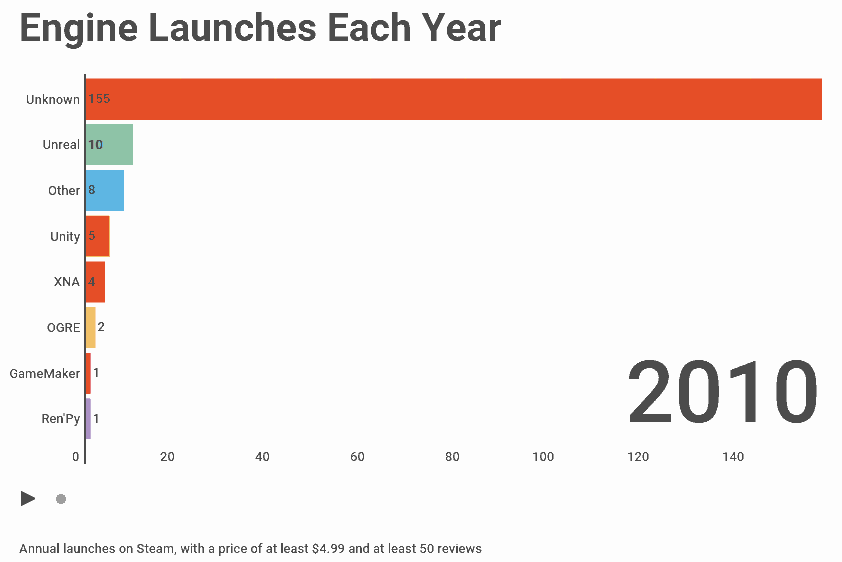
Engine Launches Each Year infogram
While we're at it, let's take a quick look at the contenders.
Here's a quick overview of the engines with at least 50 games that fit our criteria and some top-performers.
Unity (Unity Technologies). Unity was a bit of a late-comer, released in 2005 as a Mac-only engine, believe it or not. Now known for its cross-platform support and relatively minimal license fees (in part because 70% of their revenue comes from outside these fees), it is the most popular engine for game developers, especially for small and mid-sized projects.
Among Us
Cities: Skylines
Fall Guys: Ultimate Knockout
Phasmophobia
Unreal Engine (Epic Games). Named for the 1998 game that it was first used for, the Unreal Engine has been lowering licensing fees and revenue sharing requirements over the past few decades and is now accessible to almost anyone. That said, it tends more towards being used for higher-end projects.
ARK: Survival Evolved
Borderlands 3
MORDHAU
PlayerUnknown's Battlegrounds
Sea of Thieves
XCOM 2
GameMaker Studio (YoYo Games). Released in 1999, GameMaker targets more of an entry-level developer audience with a 2D focus and intuitive Drag and Drop programming. Coding in GameMaker Language (GML) is also possible and the engine now has extensive cross-platform support, along with inexpensive licensing.
Hotline Miami
Katana Zero
Risk of Rain
Undertale
Ren'Py (Tom "PyTom" Rothamel). Launched in 2004 and under the MIT open source license, Ren'Py (a portmanteau of ren'ai (恋愛), Japanese for 'romantic love', and Python, upon which the engine is built) is a visual novel engine with over 450 games on Steam.
Ladykiller in a Bind
Long Live the Queen
RPGMaker (various). The oldest entry on this list, tracing back to 1992, RPG Maker is more of a series of related engines, focused unsurprisingly on making RPGs. It has had multiple publishers over the years and in different territories.
To The Moon
Adobe AIR (originally Adobe, now Harman International). The Adobe Integrated Runtime (AIR) came out in 2008 and effectively enabled Flash / ActionScript developers to produce content that could run without a browser on Windows, Mac, and mobile, and as such a lot of the most popular Steam games are adaptations of Flash browser games. It was also used both PC applications (such as eBay Desktop and Pandora One) and mobile games.
The Banner Saga
The Henry Stickmin Collection
Samarost 3
XNA (Microsoft). The cheeky "XNA's Not Acronymed" was launched in 2006 but is discontinued as of 2013. It was released, along with XNA Game Studio, as freeware from Microsoft to develop Windows and Xbox 360 games. (Note: due to difficulties differentiating these from FNA and MonoGame, we are only looking at XNA-flagged games to avoid double-counting.)
Celeste
Rogue Legacy
Stardew Valley
OGRE (open source). An open-source project since 2005, Roblox was based on this engine until 2014. While low in volume (it just missed our cutoff at 45 games, but we allowed it), some high-profile games have used it.
Rebel Galaxy
Rebel Galaxy Outlaw
Kenshi
Torchlight (I and II)
Honorable Mentions. Some engines didn't make our 50+ game cut but deserve a mention.
KiriKiri. Quite a bit less popular than Ren'Py, KiriKiri is another visual novel engine that tends to be used heavily for adult-only games.
AdventureGameStudio. The niche point-n-click market limited the volume of AGS games, but it did produce a few noteworthy games like The Cat Lady and Kathy Rain.
Source. Valve's in-house engine was only used for a small number of games, but does include some 3rd party games such as Garry's Mod, Dear Esther, and The Stanley Parable.
Lime/OpenFL. The most popular Haxe-based game engine stack, this was used for a few stand out indie hits including Dicey Dungeons and Papers, Please (not to mention our own Defender's Quest). The mega-popular Friday Night Funkin was also made with it, though that game isn't on Steam.
Backing up the perception that Unreal is favored for larger-scale projects, we can see that 25% of Unreal games launch at a price point of $29.99+, compared to only about 6% of Unity games. The $49.99+ price point is attempted almost exclusively by games developed on Unreal or with custom engines. Meanwhile, 85% of all other game engines release under the $19.99 price point.
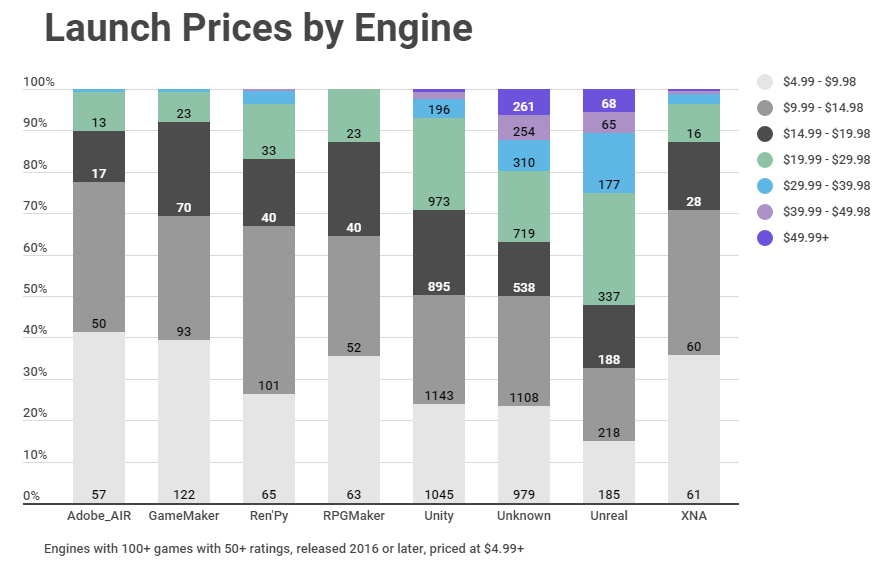
Launch Prices by Engine Infogram
About 30% of games on Steam have Metacritic ratings, but very few of them are RPGMaker (13 games with Metacritic scores) or Ren'Py (7 games). Unity games are also unlikely to get scores relative to other engines, though that's likely more of a volume issue than a genre or engine issue.
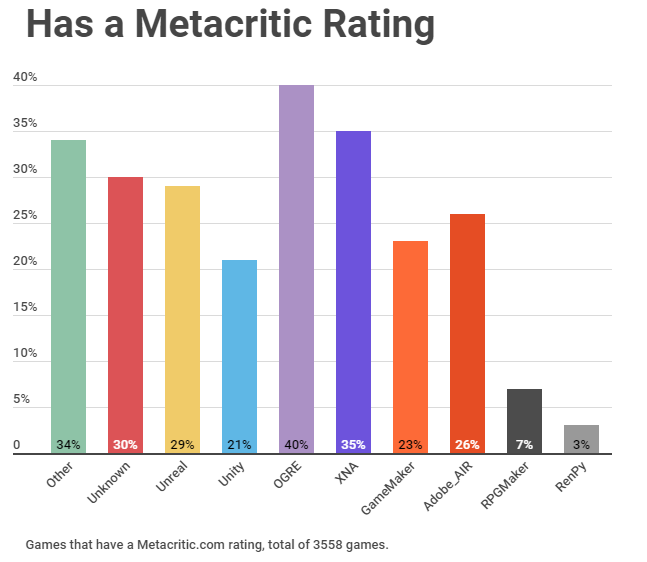
While the sample size is certainly lower, RPGMaker games have the highest Metacritic scores. Perhaps surprisingly, Unreal, along with OGRE, sport the lowest average Meacritic scores.
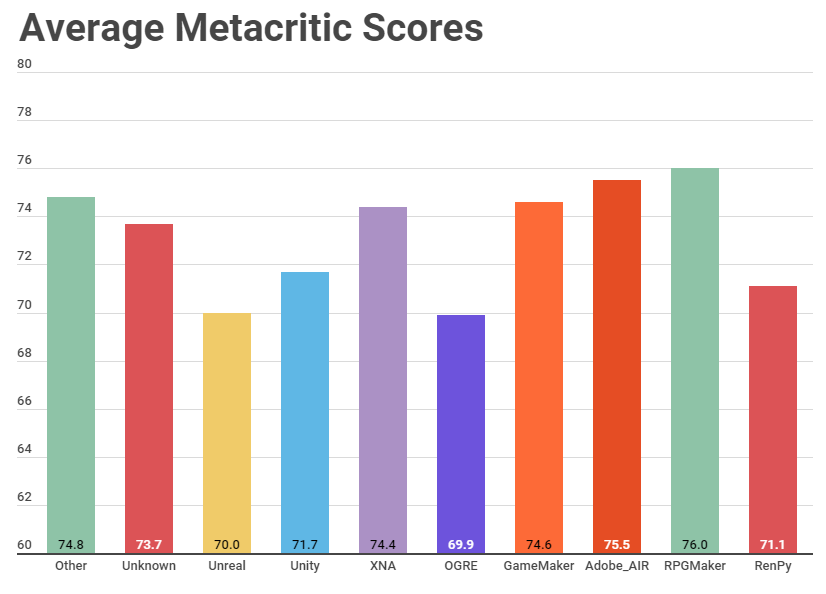
Average Metacritic Scores Infogram
Metacritic scores are controversial for good reason, but it's interesting to see how things break down nonetheless.
A pie chart version of the above chart gives us a clearer view of the market share. In 2021 so far, fewer than 20% of games launched have been created with "unknown" engines -- a category that mostly represents custom and in-house engines.
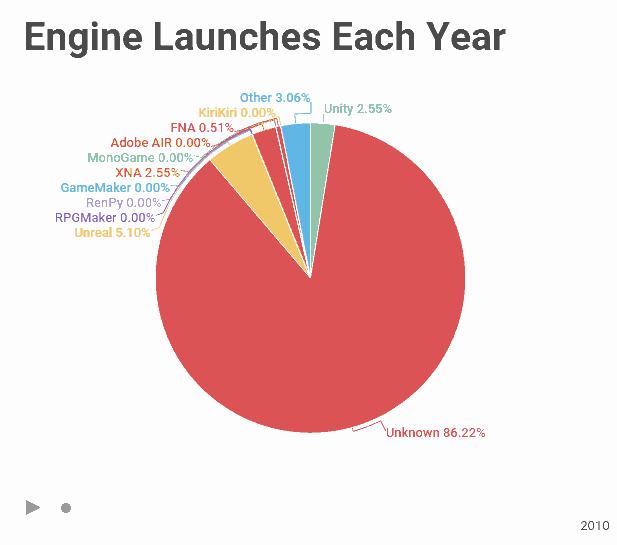
Game Engine Share by Year Infogram
We can look at Valve's announced top-grossing charts to get a view of what engine use looks like weighted by revenue, and it's a very different picture. While the vast majority of games are developed using one of the major game engines, it turns out that most top-grossing games are using custom engines. We used Steam's own internal "Platinum", "Gold", "Silver", and "Bronze" tiers that they use for end-of-year lists.
Since this is a small list, we included all engines that we could identify. Many of the "other" engines here represent in-house tech like Frostbite, so really the percentage of non-commodity engines is even more pronounced than the graph first implies.
Quick quiz: how many of the 4 Unreal and 2 Unity games that made Platinum can you name?
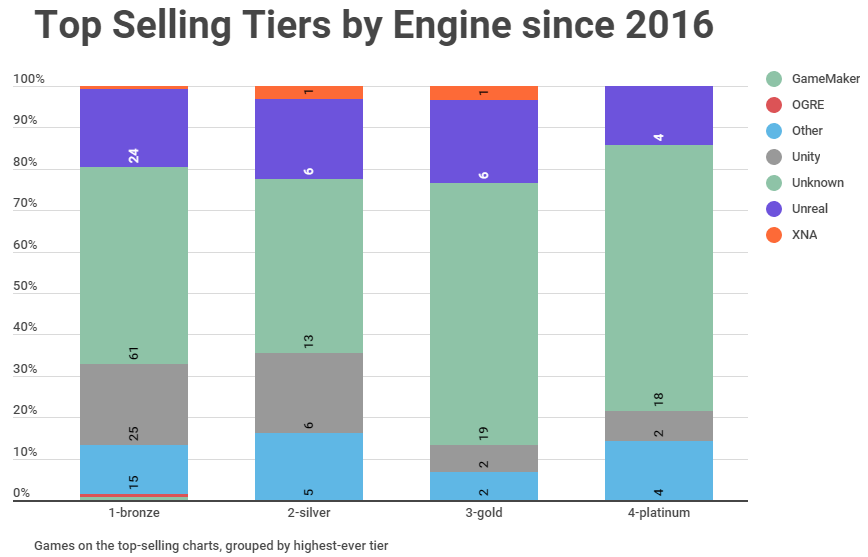
Top Selling Tiers by Engine Infogram
Of all the 1,338 games that Steam users and developers have tagged "RPGMaker", 1107 were identified by our system as truly being "RPGMaker" games, which is a hit rate of about 82%. What were the other 231 game engines that were misidentified?
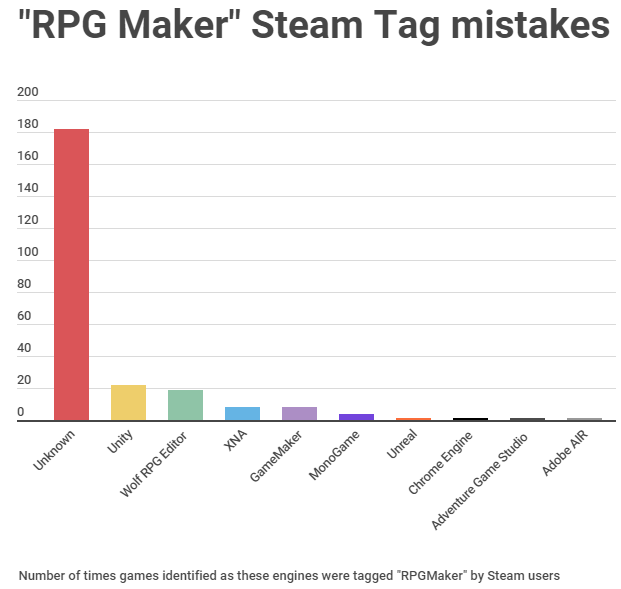
Most of them were "unknown," likely some custom engine. The most popular commodity engines were Unity and something called "Wolf RPG Editor", an engine I first learned about while doing this project. Then a smattering of XNA, GameMaker, and so on.
Our hope is that this data will be used for both productive purposes and also just to explore the data and have fun with it. I would caution everyone to take this data with a grain of salt while we continue to refine the dataset. If you're interested in exploring yourself head on over to Game Data Crunch or SteamDB and check it out, and if you want to help contribute / refine the detection heuristics, please check out our Github page.
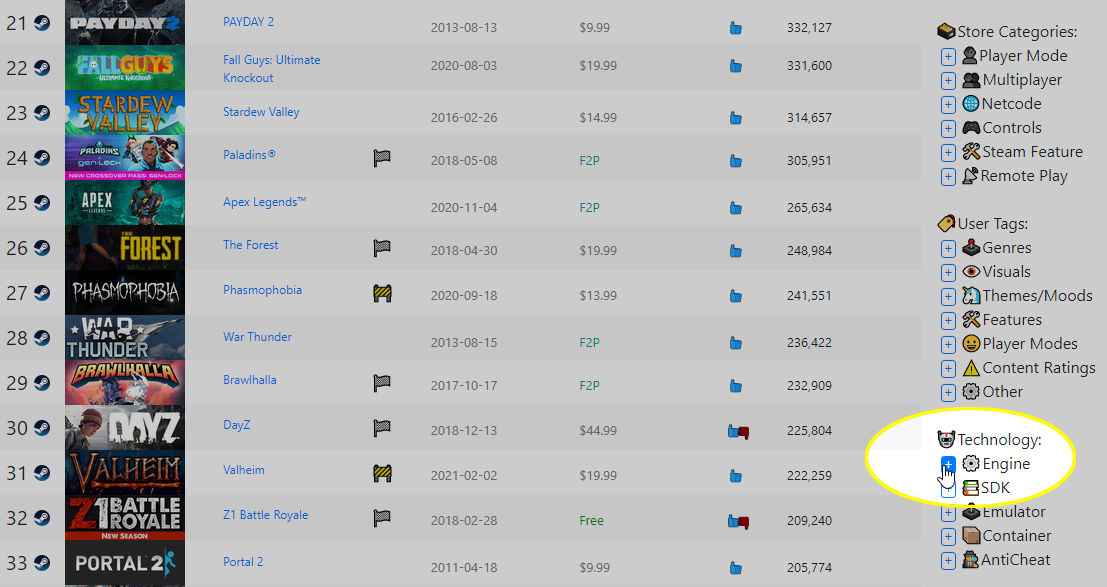
Read more about:
game-developer-launchYou May Also Like